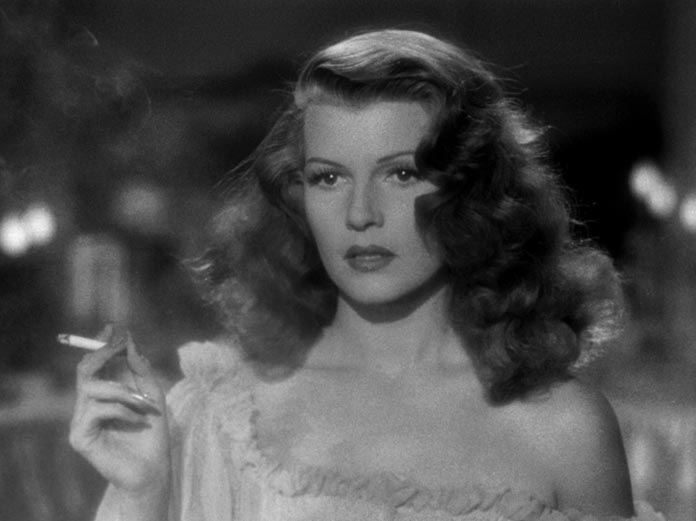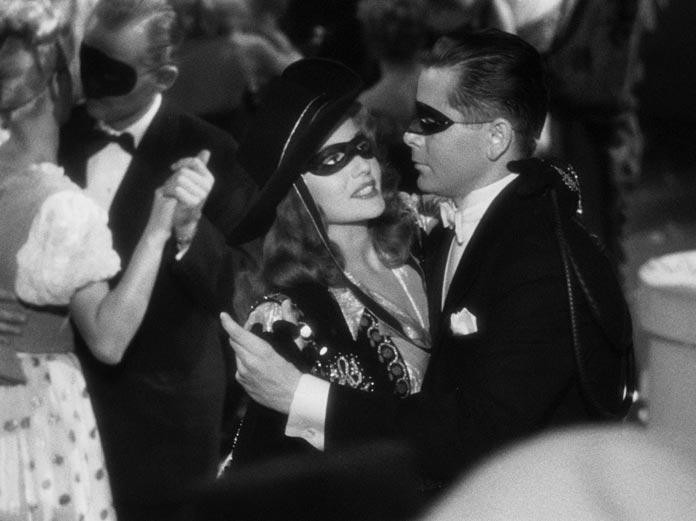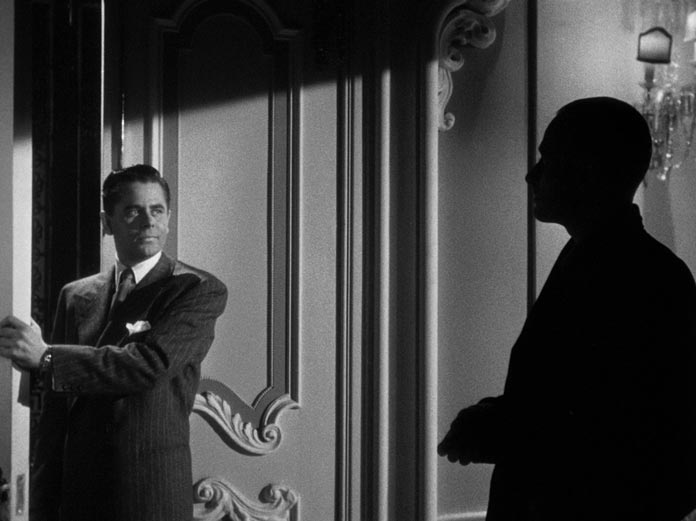Blu-Ray Review: Gilda
Published on January 27th, 2016 in: Blu-Ray, DVD/Blu-Ray Reviews, Movie Reviews, Movies, Reissues, Retrovirus, Reviews |Toronto residents can watch a special theatrical screening of Gilda at The Royal tonight at 7:30 p.m., presented by the Ladies of Burlesque.
Without Gilda, my life would have been very different. As a naïve young English major at UC Santa Barbara, I registered for a Film Noir class to fulfill a requirement for my degree. I wasn’t new to old cinema; the giant poster of James Dean on my bedroom door and my stash of Gary Cooper movies recorded onto VHS were a testament to that. I didn’t know, however, about German Expressionism, Jim Thompson novels, the word “chiaroscuro,” or how important Citizen Kane was to the development of the noir style. I would soon learn.
One of the films we watched was Gilda. Seeing a black and white film on the big screen (or at least the screen of my classroom) was a lot different than seeing it on TV. The gritty yet glamorous atmosphere, voiceover narration, and Rita Hayworth’s incredible face… suddenly Blade Runner made a whole lot more sense. In class, we talked about the homoerotic subtext between Ballin Mundson (George Macready) and Johnny Farrell (Glenn Ford) and I learned all about Freudian phallic symbols and “little friends.” The femme fatale trope in noir was another point of discussion, one that this film cleverly subverted by revealing that Gilda’s alleged infidelities and brazen behavior were nothing more than an act.
Indeed, much of Gilda is about performance. Certainly you couldn’t put Rita Hayworth in a film–an actress who was also an accomplished dancer–and expect her not to utilize the full scope of her talents. It would be like putting her in a cage, as if she were Gilda for real. Even Johnny’s braggadocio is an act, one that works on several levels, one that even he doesn’t seem to be aware of at first. Then there’s Ballin Mundson, who seems to be one thing and then turns into something else right before your eyes (who knew tungsten cartels were so sexy?).
The dialogue, from noir legend Jo Eisenger, absolutely sizzles, highlighting the thin line between love and hate, and revealing so much through double entendres and artfully constructed insults. A good screenplay is nothing without actors who can pull it off, though, and the three main cast members do so with startling finesse; Hayworth’s subtle shifts in facial expression, in particular, are perfect examples of what the kids today call “microexpressions.”
It wouldn’t be a film noir without intrigue, and Gilda has that in spades. Set mainly in an illegal casino in Buenos Aires, the film feels like a precursor to the James Bond franchise, with Glenn Ford’s Johnny as the Ian Fleming/Daniel Craig version of the titular spy: a physical brute that plays at being a glamorous criminal. He’s not the worldly tycoon that Mundson is, but he’ll pretend to be for the right price. Yet his crisis of conscience is difficult to hide; why else would he care so much about convincing Uncle Pio the washroom attendant that he’s a gentleman and not a peasant?
Despite its brazen depiction of female sexuality and it’s distinctly homosexual inclinations, Gilda is still restricted by the morals of its time period. Gilda gets slapped and accused of being a slut without actually being called one. Later Uncle Pio explains that she never did all those things. Her reputation has been saved! Would Gilda be a more interesting film if the character had been allowed to do whatever she wanted with whomever she pleased? Perhaps, but it’s that tension that makes it so delicious to watch after all these years.
Whenever Gilda was on TV, I’d watch it. I would thrill to every cocked eyebrow, every snappy comeback, and every time, it was still as exciting as the first. When I learned of the Criterion release of the film, I knew I had to own it, as much as anyone can own a film like Gilda, something timeless and intangible that reached out to me from a time before I even existed.
You see, after I saw Gilda in that Film Noir class, I changed my major to Film Studies. My life hasn’t been the same since.
Gilda was released on Blu-Ray by Criterion on January 19. At this point, it’s redundant to mention how sumptuous Criterion’s transfers are, but I will anyway. The disc comes with a wonderful essay by film critic Sheila O’Malley as well as a plethora of special features: audio commentary by film critic Richard Schickel, a new interview with film historian Eddie Muller, an appreciation of the film with Martin Scorsese and Baz Luhrmann, a 1964 episode of the show Hollywood and the Stars with Rita Hayworth, and the film’s trailer.



Time limit is exhausted. Please reload the CAPTCHA.